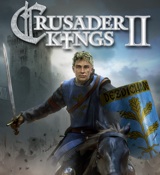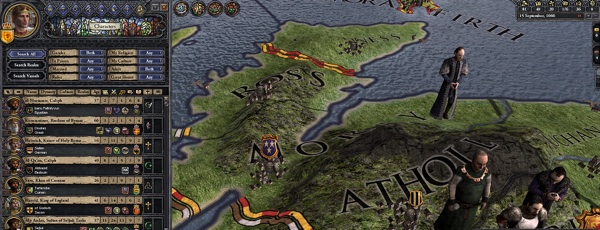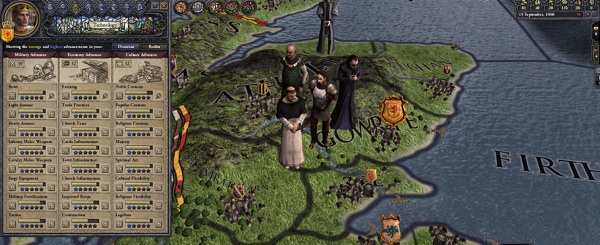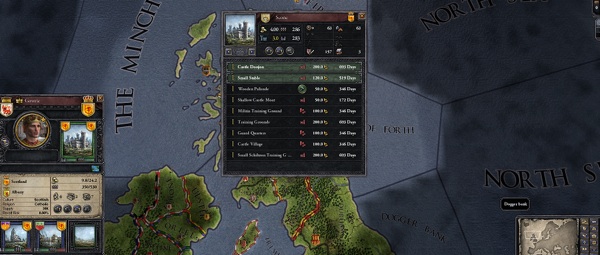Crusader Kings II – PC Game Review
 Crusader Kings II. PC Game Review. Developer/Publisher: Paradox Interactive $39.99
Crusader Kings II. PC Game Review. Developer/Publisher: Paradox Interactive $39.99
Passed Inspection: Excellent gameplay, graphics and sound; overall a high quality strategic simulation
Failed Basic: Subject matter may not appeal to all; game has a learning curve; combat lacks detail
I’ll be honest here; I’m a bit of a Paradox fanboy. I’ve been buying and playing their games since the original Europa Universalis, and especially like the Victoria series. However, I was never a Crusader Kings fanatic; there are those on the very active Paradox forums for whom there is literally no other game. I played the original Crusader Kings, and thought it was a good game but not really my style. When the fine folks at Armchair General offered me the game for review, I was a bit hesitant. I liked the first game, but didn’t really love it. I expected more of the same with Crusader Kings II.
{default}I can happily say I was disappointed. Crusader Kings II is a rarity in strategy games today; it is as far from a click-fest as a player can be in a pausable real-time game. The depth of historical detail, the smooth interface, outstanding graphics and music just add to the simple fact that Crusader Kings II is probably the best title on release that Paradox has produced. As is normal with Paradox, their team works constantly to tweak and improve their games, and CK II is no different (the 1.04 update was used for this review).
Gameplay in Crusader Kings II
Crusader Kings II has a learning curve when you first begin. Several scenarios are available, focusing on differing start dates for the campaign. Players are presented with a wide variety of menus and submenus, craftily hidden but easily accessible while playing. Of these, I found the Council and Intrigue, along with the ability to sort and select other characters (by rank, title, name, age, and so forth), to be the most immediately useful. There really are two core concepts of CK II: dynasty survivability and demesne (the personal holdings of your character/ruler) management. The first is what a player will spend most of the time trying to guarantee; if your dynasty dies out (by violent or other ends, and there is no direct inheritor), the game ends.

Crusader Kings II has a huge selection of characters—many historical— to play or interact with. From geniuses to imbeciles, great warriors and craven cowards, lusty tyrants to pious holy men, they all have their own strengths and weaknesses.
For readers unfamiliar with the game, it is a grand strategy, real-time simulation of the intricate dance of war, regional development, and good old-fashioned family values—"family values" in that most of your family is trying to kill you, your heir, his heir, each other and the Pope. In my test game as Scotland, I quickly found that the road to success was based less on improving the technology of my demesne than finding and marrying that special someone who would make all my dreams come true. Apparently, I dream of having as many children as possible, with the option of assassinating the little woman as well. Not having a family line is one of the surest of all the ways to lose Crusaders Kings II, short of conquest and death of your entire family line. The game ends when you have no remaining family heirs to inherit your titles and lands.
This brings up one of the more interesting aspects of the game: judging victory. There are several paths to victory in the game, but global conquest is not one of them. Simply put, it is nearly impossible to conquer the map. Oh, you might defeat every army on the map, wipe out their holdings, etc., but you’ll end up less like the family of Orleans and more like Genghis Khan—when you die, it will all fall apart. Even your trusted allies and advisors will quickly begin working to remove you from the throne, unless you keep them happy with fiefdoms of their own. Lastly, you can only control up to your demesne limit; while certain technologies will aid you in increasing this limit, it will never reach the level where you can personally manipulate (on a region-by-region basis) a 19th century–type empire. This is where the game really shines; it forces the player to think, to plot and to scheme to seize that really lucrative county, or to grab a worthless region in order to reward a subordinate … without making them too powerful in the process.
Combat tactics
Combat is relatively straightforward, much like that of other Paradox titles. Units are raised as either personal, vassal or realm levies. You can hire mercenaries, or if you are on Crusade, you may have the opportunity to recruit one of the religious orders, such as the Knight Hospitallier or Knights Templar. Once raised, troops are gathered and moved to the region you wish to conquer; if there is an enemy unit there, combat will begin. Units are the familiar cavalry (heavy or light), infantry (pikemen, heavy and light) and archers. On the battlefield, which is represented by a pop-up box and subdivided into three wings (left, center, right), player forces are automatically arranged against the enemy. Number crunching then follows—no 3D battlefields, just the sick feeling as your numbers drop like a stone and your army breaks.

Technology gives bonuses but is very slow to develop. Send your Spymaster out to steal, but beware—he might be captured.
Strategic gameplay
As noted above, Crusader Kings II is about families and regime survival. You can start as a lowly duke or as the ruler of the Byzantine Empire; play as a Christian, Moslem or Pagan. As in most Paradox games, this gives a certain level of challenge and replayability. The key factors of subordinate (vassal) loyalty, picking the right spouse for your main character and heirs, and keeping your opponents off-balance are critical to any strategy.
Marrying off spare children, siblings and others will often give you allies. Awarding titles to vassals can increase their loyalty to you and make the change of rulership (which happens when your character dies) much easier. Planning where and when to fight is crucial. Armies are difficult to raise and expensive; the last thing you want to do is throw away your only means of defense. Victory in CK II is determined over hundreds of years; it may be in your best interest to surrender your claims on the Duchy of Cumberland to the King of England and begin plotting to retake it by marriage, vassalage or intrigue. Unlike other grand strategy games, losing a campaign or battle isn’t the end of the game—in fact, your opponent may find himself with an angry populace of Celts who just do not seem to stay at peace … especially since your agents and spies are spreading rumors and causing dissent.

Demesne development is key. You can build or upgrade castles, towns, ports, chapels, as well as (for a hefty price) build new titles and holdings.
What makes Crusader Kings II Different
Crusader Kings II is really in a league of its own in strategy games. Most other games, many of which I play and enjoy regularly, are based on the stomp-improve-build-conquer model (stomp your opponent, improve the conquest, build new units, repeat as needed). There isn’t anything wrong with that type of game, and CK II can be played in that manner. The issue of realm size, a very intelligent AI, and the length of time involved in technology and building will do much to limit that type of gameplay, however. Simply put, it is difficult to overrun and crush every AI country on the map, and even if you do, you might not hold it for long from your own vassals and allies. The focus on dynastic survival is pretty special. I’ve had some truly great Kings of Scotland, who were soon followed by the biggest idiots, ne’er-do-wells, wastrels, and morons in the game. That, I think, is what makes Crusader Kings II a truly different game; often players will have to choose a new country or situation for replay value in a strategy game. In Crusader Kings II, you are effectively playing a new game whenever King Conrad I the Ironsides, leader of the Crusade to liberate Sicily from the Moors, is replaced by King Irving the Lackluster, who was followed by King Malcolm the Confused. Expect to lose hours and days in this game; it is a real quality product from Paradox and unlike any other strategy game on the market.
Armchair General Rating: 98%
About the Author
Dr. Robert R. Mackey, Lieutenant Colonel, USA (Ret) is a member of the adjunct faculty of Georgetown University, and a former assistant professor of history at the United States Military Academy. He is the author of The UnCivil War: Irregular Warfare in the Upper South, 1861-1865, is a regular contributor to Military History and World War II magazines, and has been an alpha/beta tester on numerous game projects.


0 Comments
Trackbacks/Pingbacks